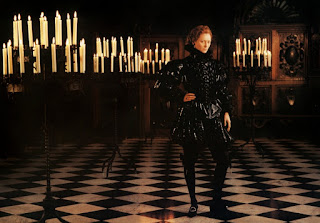 |
|
Sally Potter’s film adaptation of ‘Orlando’ staring
Tilda Swinton, Quentin Crip, and Jimmy Somerville (2010).
|
In The Historical Novel (2010) Jerome De Groot argues that during the twentieth century the historical novel has become more prevalent but also increasingly marginal. Not until after the Second World War and the rise of postmodernism did historical novels take on more interest by writers and theorists. The First World War seems to have given pause to authors and acted as a fragmentary influence as best described by Virginia Woolf. In 1925 Woolf argued that the genre needed ‘shacking up’. It lacked innovation and focused on the trivial and insubstantial when it should focus on the complexity of human experience, feeling, and knowledge. In short (as de Groot summarises):
‘Woolf argues for an interest in interiority, rather than the “alien and external”, a return to the individuation of experience. She criticises convention and urges novelists to remember that “everything is the proper stuff of fiction, every feeling, every thought; every quality of brain and spirit is drawn upon; no perception comes amiss”. This desire to adumbrate the detailed complications of life, allied to a clear interest in representing the psychological and in breaking formal conventions, forms the outline of what is often defined as literary modernism.’ (de Groot, p. 42).
Woolf’s Orlando (1928) does just this by fracturing historicity and doing all it can to upset the rationalism and realism of historical fiction: ‘the dullness of convention’. The novel follows a man who does not die from the Tudor period through to the twentieth century. Orlando even changes gender at one point threatening the integrity of identity and order. Why is Woolf doing this? Well, she wanted to show that historical fiction need not always attempt true depictions of historical events but instead to find a greater truth about what it means to be human. H. G. Wells Time Machine (1895) had done something similar by undermining history: rather than time being inescapable the protagonist finds that it is actually traversable.
The Novel Approaches Virtual Conference will start tomorrow at 10am!

